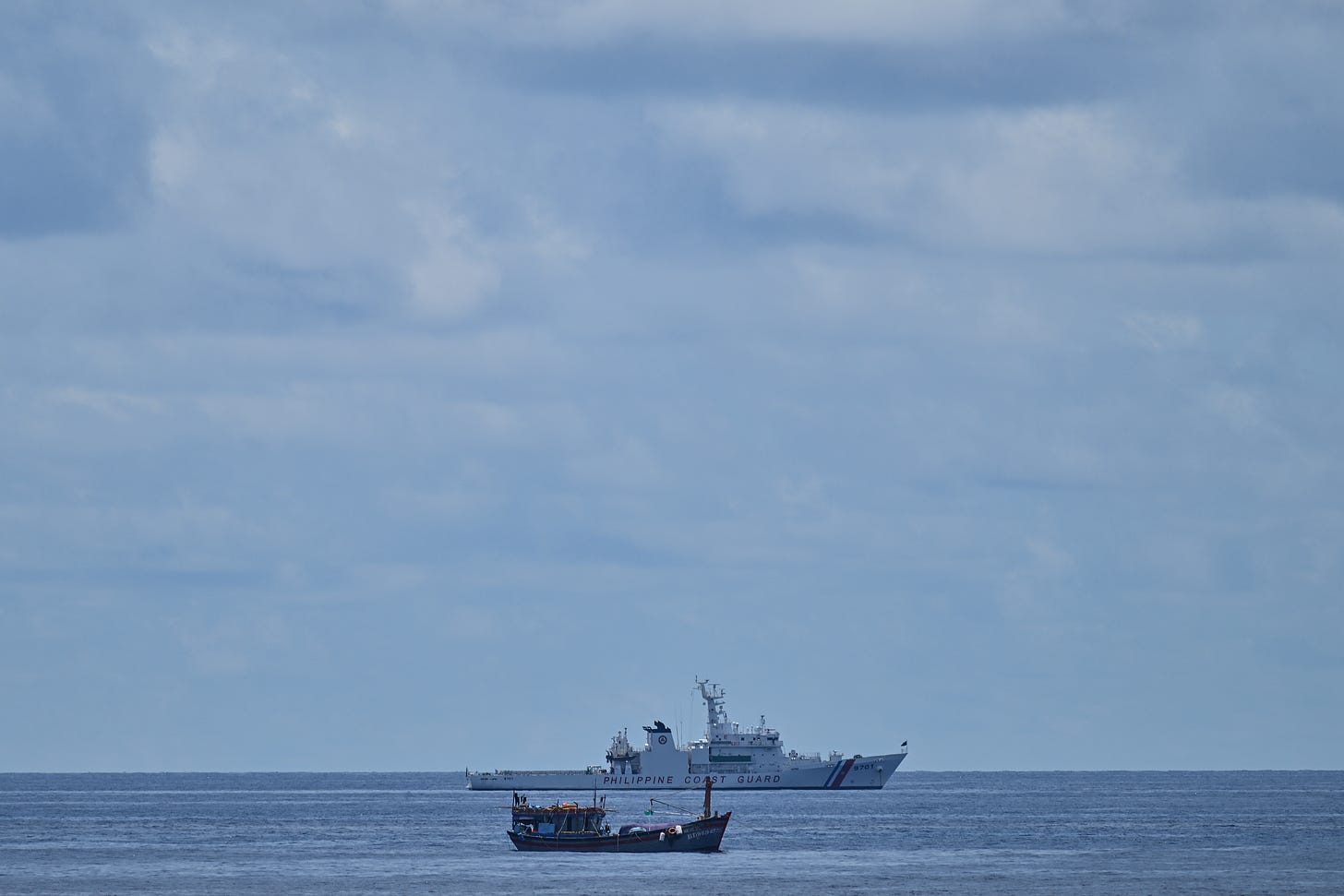The Philippines' misjudgments on South China Sea issues: A guest's opinion
"Manila is likely to misjudge the reliability of its alliance and China's resolve to safeguard its sovereignty."
Good evening. Today’s post focuses on an incident that a Philippine coast guard ship caused a scrape with a Chinese vessel early morning on Aug. 19, in waters near Xianbin Jiao, and intruded into the waters of Ren'ai Jiao in China’s Nansha Qundao. It came not long after the two countries reached an agreement on the Philippines' resupply missions to a grounded ship in Ren'ai Jiao. The incident may cause new instability in the South China Sea.
Xinhua journalists Zhao Chenjie, Xia Tian and Ren Ke all traveled to the South China Sea in recent days, witnessing two coast guard vessels from China and the Philippines respectively, facing off near the waters of Xianbin Jiao, surrounded by several fishing boats working around the reef. They also saw the Philippine military ship, BRP Sierra Madre, which has been grounded in the lagoon of Ren'ai Jiao since 1999.
Today's opinion piece is written by Prof. Li Kaisheng, senior fellow and vice president of the Shanghai Institute for International Studies. Prof. Li is also vice-chairman of the Shanghai Association for American Studies. His areas of expertise include Chinese foreign strategy, East Asian security, the Belt and Road Initiative, non-traditional security, and international relations theories.
Prof. Li thinks that the reason behind the latest provocation is the Philippine government needs a tough-guy image to gain domestic recognition and support. However, Manila is likely to misjudge the reliability of its alliance and China's resolve to safeguard its sovereignty.
Philippines' misjudgments behind intrusion around China's Xianbin Jiao
by Li Kaisheng
Imagine an intruder trespasses into your backyard and causes damage. You ask him to leave, but without any sense of shame, the intruder claims your property belongs to him. And what's worse -- he tells all your neighbors that you are bullying him and violating his rights.
A similar scenario is unfolding in the South China Sea. Since April this year, the Philippines has been illegally anchoring a coast guard ship at China's Xianbin Jiao of Nansha Qundao. On Monday, a Philippine coast guard ship caused a scrape with a Chinese vessel in waters near Xianbin Jiao.
Since Ferdinand Romualdez Marcos Jr. took office as president, the Philippines has frequently used the South China Sea issue to play geopolitical games, trampling China's goodwill in maintaining regional peace and stability.
The recent move shows that the Marcos government -- with lackluster domestic performance -- is in urgent need of a return to its tough-guy image, after a series of Philippine military infringements were stopped by China Coast Guard, including the "resupply mission" to Ren'ai Jiao in mid-June.
Compared to Rodrigo Duterte's presidency, Marcos has pivoted back to the United States from a pro-China stance. The Marcos administration has allowed Washington to strengthen its military base construction and arms deployment in the Philippines, including the presence of an intermediate-range missile system, which undermines regional security.
On June 29, the Philippine Coast Guard ship and a fishing boat in the waters of Xianbin Jiao, Nansha Qundao, South China Sea. (Photo taken by Sun Ruibo, Xinhua photographer
By hyping up the South China Sea issue, Marcos could manipulate the Philippine people's sentiment, increase his domestic recognition, and gain support from the military and other stakeholders in the Philippines.
Manila's calculation may seem shrewd, but unfortunately, it is based on erroneous judgments.
The Philippines has underestimated China's resolve to safeguard its sovereignty. With the support of certain Western countries including the United States, Manila has formed a false understanding that China will not dare come down hard on the Philippines.
Indeed, China has always prioritized solving problems through negotiation and consultation, promoting peace and stability. In most cases, China has maintained restraint, but certain countries have taken advantage of China's goodwill to repeatedly provoke in the South China Sea. China's policy position has always been uncompromising when it comes to sovereignty issues.
The Philippine vessel's entry and anchoring in the lagoon of Xianbin Jiao without permission has seriously infringed on China's sovereignty and violates the Declaration on the Conduct of Parties in the South China Sea. If Manila continues to break its promise, China will certainly take countermeasures and the Philippines will inevitably lose more.
The Philippines has also misjudged the international situation. Washington has been exaggerating the "ironclad" U.S.-Philippine alliance, and has stressed that a mutual defense treaty with Manila has committed to help defend the Philippines, if Filipino forces, ships or aircraft come under armed attack.
But anyone with a discerning eye can see that the Biden administration has repeatedly emphasized conflict management with China, and is unwilling to risk armed conflict with China.
If Manila is wise, it should try its best to control any events that could lead to conflict. Unfortunately, if these misjudgments of the Philippines further escalate tensions on the South China Sea issue and deteriorate bilateral relations, the interests of the country and its people would suffer the most.










